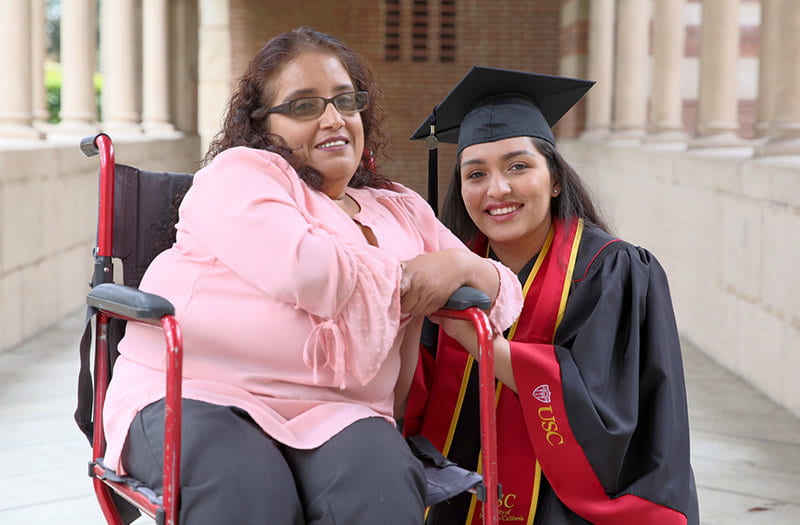A year ago, Kimberly Cuellar was struggling with injuries from a hit-and-run. On May 10, she will make history for her family, becoming the first to graduate from college. [4 min read]

Around 9 p.m. on March 29, 2018, Kimberly Cuellar drove two of her friends to buy snacks in the neighborhood west of USC’s University Park Campus. She parked, and as she slid out of the driver’s seat, an oncoming car sped through a stop sign and struck her.
Her head was bleeding, her nose broken. Her legs were injured. The hit-and-run driver was never caught.
Cuellar, 21, had a concussion. Although she was quickly released from the hospital, the symptoms continued for weeks. “My speech was disoriented. My memory was really foggy. My cognitive skills were off. It took a toll because I didn’t stop going to class. I went right back to school,” she said.
Cuellar was determined to finish her courses without pause. On May 10, she will walk across the stage at USC Commencement to receive her USC Dornsife degree in social science with an emphasis on psychology.
Cuellar’s achievement is monumental for her mother and grandparents: She is the first in her family to earn a college degree.
She and her mother, Linda Aguilar, have been planning this moment nearly all her life, ever since Cuellar was 5.
A vision for her daughter
Dependent on a wheel chair due to spina bifida, Aguilar remembers steering across the campus with her young daughter perched on her lap. The pair would frequently visit USC, passing the Tommy Trojan and Traveler statues, marveling at the brick buildings and the beautiful grounds. They watched students hustling by, meeting friends or discussing their studies. Aguilar imagined that Cuellar would be one of them, and whispered so.
“She would always tell me, ‘You know, you can come to this school or to a school like this,’” Cuellar recalls.
USC represented everything Aguilar wanted to give to her daughter, her only child. It promised a prestigious education, a clear path into a profession, stability. It held for Cuellar a future that was starkly different than the one that Aguilar had fled years before, when Cuellar was an infant, and they were living in Guatemala in poverty and fear.
Aguilar left with Cuellar for the United States in 1999 when Cuellar was just a year old. Aguilar reunited with her own mother, who had fled Guatemala years before and was living in South L.A. She then sought protected status for her and her daughter, and they were eventually granted citizenship.
“I came to the United States because my mother was here, and because I hoped for a better future — for my daughter, specifically,” Aguilar recalls.
When Cuellar was in middle school, Aguilar urged her daughter to apply to the USC pipeline program, Neighborhood Academic Initiative (NAI), a rigorous college readiness program that USC runs at Foshay Learning Center, a Los Angeles Unified School District school in the neighborhood just west of University Park Campus.
“She loved to study. She couldn’t stand missing school, didn’t like being out of it,” Aguilar said. “My sister thought she would be a good candidate” for NAI.
And so did NAI’s leadership. The program, in its 22nd year, requires rigorous course work, both for the students and their families, to prepare them for college. It set Cuellar on a path to USC.
The finish line in sight
So, when Cuellar was struggling to recover from her injuries last year, she and her mother turned for help from the people who had guided her and her daughter through college preparation: the NAI team. NAI Executive Director Kim Thomas-Barrios and student programs adviser Mimi Bolton ensured that Cuellar was given financial support for her medical therapies, aiding in her recovery as she completed her studies.
On Tuesday, Aguilar watched as her daughter placed her red satin USC graduation sash on her neck to pose for photos. Aguilar’s voice began to tremble: “I feel very emotional. I feel the weight of this because this journey hasn’t been easy, because a year ago, she was hit by the car,” Aguilar said. “And from this somehow, she rose up. She didn’t miss a single semester. She spent very little time in the hospital. She balanced going through treatments, and yet she passed her classes like nobody else.”
An unforgettable lesson
Over the past year, Cuellar has turned to professors to come to grips with the trauma of the hit-and-run. One was Lanita Jacobs, associate professor of American studies and anthropology, who urged Cuellar to slow down and focus on healing.
“Kimberly Cuellar reassures me that teaching is a gift, one where your students end up teaching you a thing or two about intellectual curiosity, resilience, and even love,” Jacobs said. “I’m so grateful that the car accident she experienced didn’t rob her of this, or rob us of her.”
Jacobs added: “I salute her now as I did then for modeling something all Trojans must learn if they haven’t already: When you’re going through hell, keep going — ideally with grace and gratitude for another hard-to-teach lesson: What doesn’t kill you makes you stronger and, best, wiser.”